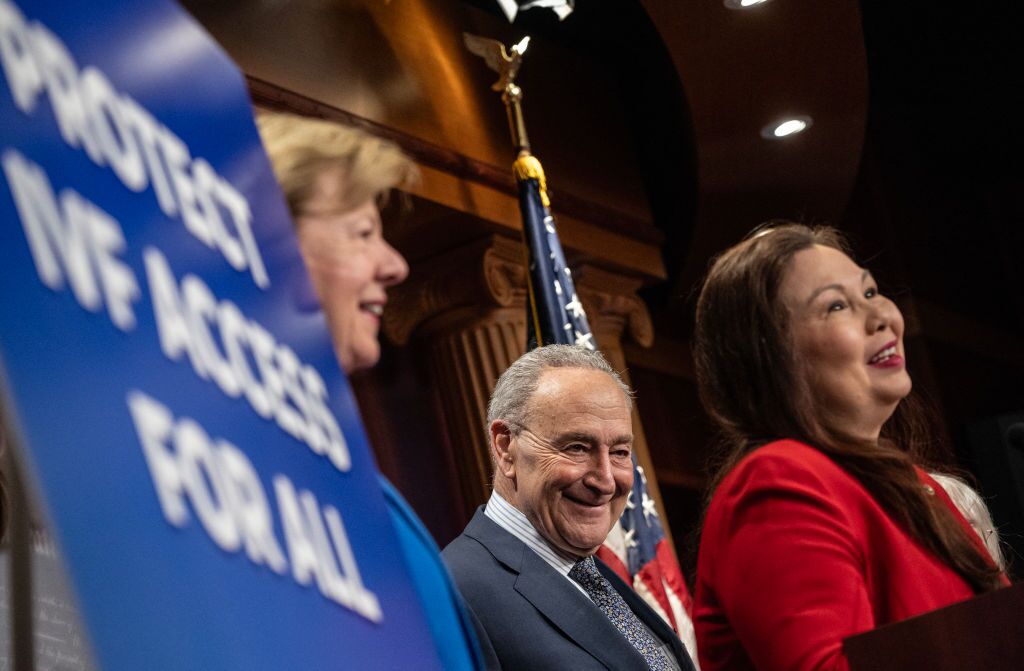
Tim Walz Looks Into the Void
April 23, 2025
How Trump Forced 60 Minutes Chief’s Shock Resignation
April 23, 2025It’s one thing for the government to empower families to choose to have more children. It’s another to force women into motherhood—and penalize those who opt out.
This story originally appeared on Jill.substack.com, a newsletter from journalist, lawyer and author Jill Filipovic.
The Trump administration wants to juice the birthrate. This isn’t surprising: Vice President JD Vance is an ardent pronatalist, as is shadow president Elon Musk, who seems to be working on populating Mars with his own progeny. Abortion opponents, who make up a solid chunk of Trump’s base, want to see women have more babies whether we like it or not. Republicans and the Christian conservatives who elect them have generally been on the “be fruitful and multiply” side of things.
What’s different this time around, though, is that the Trump team is looking at carrots, not just sticks, in their baby-boom strategy.
While the old way was to restrict abortion and make contraception harder to get, some of the proposals on the table now include things like cash for kids, mommy medals, reserving scholarship program spots for young people who are married with children and (somewhat bizarrely) menstrual cycle education so women can figure out when they’re fertile and a national medal for motherhood for women with six or more children.
Feminists generally don’t seek a particular reproductive outcome other than women having the freedom to choose for themselves, with support for whichever path they walk.
One of these ideas is a good one: a cash bonus for kids. Kids are expensive; societies should support families. Handing over $5,000 to new moms sounds like a great idea to me.
But note that what isn’t on the list are the basic things that actually enable parents (and especially mothers) to parent and also have lives and jobs: paid leave and affordable childcare. Also not on the list are the basic things that would help underprivileged women survive pregnancy and early motherhood, and would help their babies survive infancy and childhood: Investments in rural maternal health, Native maternal health and Black maternal health.
This is not by accident. There is a difference between using the power of the government to support families in choosing to have more children, and using the power of the government to compel women into childbearing and punish women who don’t comply. The Trump team is picking the latter.
Feminists are often pitted against pronatalists, but in truth, it’s feminists who have pushed for some of the most expansive policies that support mothers and children.
The key is that feminists want to support all kinds of reproductive decisions—whether that’s having a bunch of kids, none at all, or doing what most American women do and walking a path in-between: spending many years trying not to have children, some period having them and a long time raising them. And so we advocate for contraception access and abortion access, but also IVF, generous paid family leave, universal childcare and well-funded public education. Feminists generally don’t seek a particular reproductive outcome other than women having the freedom to choose for themselves, with support for whichever path they walk.
This administration is not interested in women having choices. It’s not even interested in keeping women or children healthy. It’s interested in women having babies, whether by force or coercion—and, apparently, having those babies in less-secure and less-safe circumstances.
How else do you explain the cuts to the health department’s Division of Reproductive Health? Or the axing of funds for rural health care? Or the fact that Medicaid, which pays for more than 40 percent of all births in the U.S., is on the chopping block?
The administration is also considering policies that would effectively punish people for being single.
One proposal on the table is reserving 30 percent of Fulbright scholarships, which typically go to recent college graduates, for married people and parents—even though far fewer than 30 percent of college seniors and recent college graduates are married with children. The Fulbright program doesn’t exclude married people or parents, they just have to compete on the same footing as the single and childless. This proposal would effectively hinder opportunities for those who have done what is frankly usually the more financially and personally responsible thing: waiting until they’re ready to marry or have children. (People who wait until their late 20s or into their 30s to marry have lower divorce rates and more financial stability.)
Also: Maybe there’s a good reason people who are single and childless are more likely to participate in a scholarship program that sends them abroad? That’s not exactly an easy or even desirable thing to do as a couple with a young child—who, again, are in no way barred from the Fulbright program or disadvantaged as applicants.
The Trump administration is also reportedly considering a plan to make IVF more accessible and affordable. I truly hope they do it, although given the religious right’s general opposition and this administration’s medical illiteracy, I’m skeptical that they will back a full range of fertility treatments. Still, it’s hard to say. The Trump-adjacent tech bros are very keen on fertility treatments, not only because those treatments help to make more babies, but because they are highly profitable—and many of Silicon Valley’s most outspoken pronatalists are also investors in fertility startups. And many of these startups promise the possibility of “better” babies: embryos that can be selected for IQ and desirable physical features, and rejected for potential health issues or undesirable traits. (There is a word for this).
Abortion opponents often oppose IVF because the procedure can involve the disposal of, or at least indefinite freezing of, embryos. But despite their claim that a fertilized egg is the moral equivalent of you or me, we’ve never really seen them protesting at IVF clinics or making too big a deal about the millions of embryos that are discarded every year—even though more of these “lives” are lost through IVF than through abortion. And so I suspect that as long as the Trump administration remains keyed into the primary commitment—constrain women’s lives and freedoms by banning abortion and restricting contraception—the antiabortion movement will get on board with any Trump-penned IVF plan. That plan, I suspect, will help to enrich big tech and private corporations more than it will actually help families in need. But I would be thrilled to be proven wrong.
I’m strongly in favor of making IVF more affordable, and I am even more strongly in favor of programs that help out new families. Babies are expensive. We know from public opinion surveys that many people are not having as many children that they want, in part because they feel they can’t afford kids.
I suspect … the antiabortion movement will get on board with any Trump-penned IVF plan. That plan, I suspect, will help to enrich big tech and private corporations more than it will actually help families in need.
And they’re right! Housing costs, especially in the big U.S. cities where the college-educated congregate, are absurd. Student loan debt—which Trump has made worse—is crushing. Childcare costs are exorbitant, while the care itself is often low quality. The U.S. is one of the only countries in the world without a paid maternity leave program, leaving too many American women in an impossible situation. And while maternity leave is key, the lack of paternity leave is also unconscionable—especially if we want fathers to actually father.
It might also help if the president wouldn’t tank the global economy.
This is, in other words, a whole-society problem. And so a $5,000 baby bonus seems like the very least we can offer new parents who will blow through that in short order in a nation with no other support systems for them.
But we could also offer real support systems instead of medals, scholarship slots and one-time baby bonuses.
Great Job Jill Filipovic & the Team @ Ms. Magazine Source link for sharing this story.





